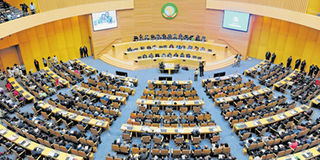Key to unlocking Africa’s potential to prosperity is having strong institutions

African leaders during a past summit of the African Union (AU) in Addis Ababa, capital of Ethiopia. Numerous studies on African governance have attributed the continent’s underdevelopment to non-democratic political systems. PHOTO|FILE
What you need to know:
Potential alone, however, is not enough to propel Africa into such a reality. What would it take for this ‘sleeping giant” to transition from potential to prosperity?
From bountiful natural resources to world renown tourist attractions, Africa has the potential of transforming from the poorest region in the world into a major economic power.
Potential alone, however, is not enough to propel Africa into such a reality. What would it take for this ‘sleeping giant” to transition from potential to prosperity?
Numerous studies on African governance have attributed the continent’s underdevelopment to non-democratic political systems.
It is argued that a shift from authoritarian to democratic institutions can potentially increase a country’s economic growth by 20 per cent of GDP per capita over the course of 30 years.
Democracy, scholars argue, can stimulate economic growth as it allows equitable and inclusive distribution of public resources, as well as restricting a few powerful elites from monopolising and abusing political power.
Moreover, democratic regimes provide peaceful pathways of resolving conflicts, which in turn may help a country to efficiently focus its resources towards development.
Exemplary success stories
However, an observation on development patterns in Asia tells us a different story.
Despite the reported authoritarian nature of Singapore and China, their economies are heralded as exemplary success stories.
Singapore, being among the top ten developed countries in the world, is categorized as being in the “flawed democracy” by the Economist Intelligence Unit (EIU).
The classification is based on electoral process and pluralism, civil liberties, the functioning of government, political participation, as well as political culture.
Likewise, China’s political system, recognised as an “authoritarian regime”, has competently steered the country into high levels of economic growth, with 850 million people being lifted out of poverty to date, according to the World Bank’s report.
This phenomenon has emboldened some leaders across the globe to perceive that, authoritarian regimes are more effective than democratic ones.
It is argued that authoritarian regimes under competent political leadership can just as well, if not better, transform their countries into high levels of economic growth.
They are said to be politically convenient; the leadership being unrestrained in implementing reforms, therefore benefiting from efficiency gains.
Authoritarian regimes
Going by this logic and given that Africa is characterised as the least democratic region with the highest number of authoritarian regimes (22), the region should have been ranked the wealthiest economy in the world.
The reality is that countries under different regimes (democratic versus authoritarian), under certain conditions, can potentially produce the same development outcomes.
For example, Sweden and Singapore respectively, have more or less the same ranking of high living standards as depicted in the Human Development Index (HDI) of 2018, even though there is a significant disparity in their democratic indices.
It is by far, more beneficial for a country to adopt democratic values, as they have proved to be more resilient to sustaining peace and political stability.
Nevertheless, democratic practices alone are inadequate to transform Africa from having great potential to economic prosperity; neither will authoritarianism fast-track the continent into economic revolution as is the belief of some.
Singapore’s transformation is mostly a factor of visionary leadership that has built competent institutions positioned to deliver strong economic outcomes. When thinking of institutions therefore, one should look beyond organizations and structures to the rule of law, codes of conduct (as laid down in the constitution), and norms which guide decision making, and restrict political elites from benefiting at the expense of the nation’s greater good.
Rule of law
Singapore has one of the most efficient bureaucracies in the world. One of the reasons for this success is strong adherence to the rule of law which constrains individual interests of elites over institutions. As a result, it enables autonomy on public agencies to optimise the country’s limited resources into economic gains through highly skilled human capital.
The same can happen for African countries when they change the posture of their institutions. As the late Professor Calestous Juma of Harvard University stated, “those leaders who think that by merely flouting political power they will help their countries to grow are misreading the history of Singapore.”
If there is a lesson to learn from Singapore and any other developed country, it is the leadership’s capacity to direct their institutions from being mere machinery by which to obtain and retain political power, to vehicles for developing their workforce, civil service, and natural resources value chain. These can be aligned with long-term strategies to deliver economic transformation for their countries.
It is not too late for Africa to reposition its political systems and build strong institutions that can catapult it from potential to prosperity. This intervention would be just the lever Africa needs to shoot from behind into a global position of economic dominance.
With strong institutions driving its development agenda, the world would finally witness the sleeping giant charging into a roaring lion.
Mhando Mbughuni is an expert in policy analysis and global governance




